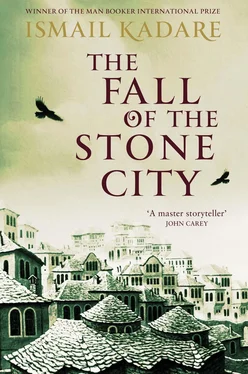He sprinted across the office yard. His colleague Arian Ciu, with a pale, waxen face, was trying to make a phone call. “All the lines are engaged,” he said with a guilty look.
Shaqo Mezini, short of breath, did not reply. “Are there any instructions?” he finally gasped.
A short call had come from headquarters in Tirana. “Everybody at their post. This is an order.” There was no further explanation.
“At our posts,” Shaqo Mezini thought. “Of course.”
An inscrutable expression crossed Arian Ciu’s face.
“No more?” Shaqo Mezini asked. The lines had been busy for the past hour. “Is the chief in his office?”
“Yes. Our enemies are rejoicing too soon. That was all he said.”
“Are you scared?” Shaqo Mezini asked suddenly.
Arian Ciu did not know where to look. “No. What do you mean by that?”
Shaqo Mezini was overcome by a wave of emotion he had never felt before, a barely resistible urge to lay his head on the chest of his office colleague, and say, “Hold on to me, brother. We’re both lost.”
The door opened noisily. The chief of investigations entered, stared at them as if surprised to find them there, and just as noisily departed again.
They stood in silence and looked towards the window. It gradually dawned on them that they were both looking in the direction of the military airport. How incredible to think back to the time when the investigators from Berlin and Moscow had landed there.
At midday the station chief held a short meeting in his office. The latest bulletin reported no change in Stalin’s condition. The orders from headquarters remained the same: everybody at their posts. The radio was broadcasting classical music and two of the typists were in tears.
At four in the afternoon Shaqo Mezini jumped to his feet. His face glowered. “Get up,” he said to his colleague. “Let’s go.”
“Where?”
“You know where.”
Without a word to anybody and with unsteady steps they set off for the prison. Sometimes the noise of their footsteps seemed too much to bear and the cobbles cracked explosively under their boots, and sometimes the sound was muffled, as if they were walking on clouds.
In the Cave of Sanisha they found Gurameto stretched out as usual on his straw mattress. He did not move when they entered or even when they called his name. The marks of torture were clearly visible on his cheeks.
“So you’re pleased at this, are you?” said Shaqo Mezini. “You heard Stalin is ill and you’re pleased at this, scum.”
He was still short of breath from the hurried ascent and he could barely utter the words.
“He can hardly breathe, and this makes you happy, doesn’t it?”
A faint gleam in Gurameto’s eyes suggested to the investigator that medical curiosity was one of the few instincts that the doctor retained. The investigator tried to conceal his own shortness of breath but this made it worse. The imprisoned doctor had probably taken what he said about breathing to refer to himself, not Stalin.
“Stalin can hardly breathe, do you hear me?” he shouted. “He’s dying and you’re glad, is that right?”
The prisoner did not reply.
The investigator’s eyes wandered to the corner where the old instruments of torture glinted dully. He remembered a few years ago a British collector, who was fond of Albania, wanting to buy them for pounds sterling.
Arian Ciu was looking at them too. “For what other occasion were these tools intended,” Mezini thought.
But he surprised himself by saying something else. “Gurameto, you’re a doctor. You can’t be pleased when someone is barely breathing, can you?” He brought his face close to the prisoner and continued in a whisper. “You would like to cure him, wouldn’t you? Speak!”
He thought he saw the man nod, but he could not be sure.
“Dr Gurameto,” he said gently. “You have it in your power to cure Stalin.”
He drew close to the man’s head again and murmured into his right ear. A word from him, or rather, his signature at the end of the record of interrogation would perform the miracle. It was said that it was worry over the failure to expose the Jewish plot that had laid Stalin low. So, the news that the plot had been exposed would surely restore him to life. “Save Stalin, doctor,” Shaqo Mezini gasped.
The other investigator watched dumbfounded.
Shaqo Mezini was close to collapse. Like his voice, his knees were giving way. His ribs were melting like candle wax and could no longer contain his heart. He felt an overpowering desire to hold the prisoner in his arms, to weep with him.
Did he fall to his knees now, or had it been some time ago? With a trembling, beseeching hand, he held out the document. “Bring him back to life,” he said tenderly. “Stalin’s resurrection is more important than Christ’s. Raise Stalin from the grave!”
This final plea exhausted him completely.
Both men watched the prisoner, making no movement.
This time Shaqo Mezini thought he saw Gurameto shake his head. “No!” the investigator screamed to himself, holding his hands to his eyes, as if blinded.
The next day in the office the hours crept wearily past. First one man and then the other looked into the distance towards the small military airport. They knew they were waiting in vain but their heads automatically made the same movement.
During the afternoon the phone calls petered out. Not just the office but the whole country seemed stricken. Arian Ciu stepped out occasionally to the next-door offices in search of news but each time came back without a word. The order was still the same: everybody at their posts. It became a catchphrase.
After his tiring night, Shaqo Mezini could not keep his mind focused. The desolate appearance of the airport depressed him more than anything else and reminded him of another dream, about how he might become one of the “high-flyers”. He had been struck when he saw the German investigator descending the aircraft steps in his casually unzipped leather jacket, his scarf blowing in the wind. He would have liked to look like this, the socialist camp’s famous investigator landing at airports in Budapest, Moscow and Sofia, in pursuit of the common enemy. He remembered the familiar exhilaration of times like this, which he associated in his mind with a particular song.
We are sons of Stalin
Prepared to do and die
Until the hammer and sickle
O’er every land does fly.
Now this dream, like the Great Man’s breathing, was ebbing. It was like that afternoon long ago when he had come home after a tedious meeting and his mother, with a bewildered expression, had handed him a letter left by his fiancée. “Don’t try to understand why. There’s no going back.”
And so it turned out. She never came back and he never found out the reason why. Sometimes he suspected himself of avoiding the truth. At home, whenever his fiancée was mentioned, he saw an unspoken question in his mother’s eyes. How can this son of mine, who uncovers everyone’s secrets, fail to understand his own mistake?
After the arrest of the two Gurametos, when their entire list of patients was screened, Shaqo Mezini was horrified to see not only his mother’s name but his fiancée’s. Numb with shock, he carefully checked the dates. Her appointment was three months after their engagement and five weeks after they had first slept together. Obsessively, he asked himself the reason for this visit and why she had kept it secret from him.
During the first investigation of Big Dr Gurameto, his eyes drifted involuntarily to the doctor’s right hand, the one that performed gynaecological examinations.
He pictured that silent afternoon when she had left the house with bowed head to go to the hospital, who could tell why.
Читать дальше












